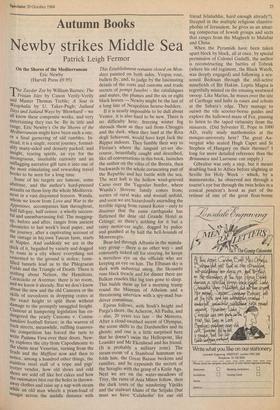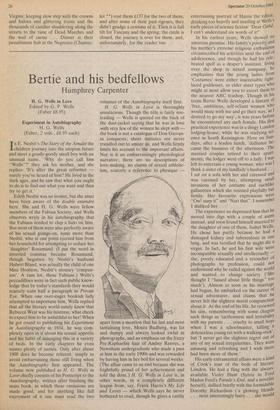Autumn Books
Newby strikes Middle Sea
Patrick Leigh Fermor
On the Shores of the Mediterranean Eric Newby (Harvill Press £9.95) The Zuyder Zee by William Barnes; The Frisian Isles by Canon Verily-Verily and Master Thomas Treble; A Seat in Westphalia by U. Taker-Pugh; Jutland Days and Jutland Ways by 'Blowhard' – we all know these composite works, and very entertaining they can be. By its title and range, Eric Newby's On the Shores of the Mediterranean might have been such a one, or a final garnering of old rambles. In- stead, it is a single, recent journey, formid- ably many-sided and densely packed, and insight, tearing spirits, an eye for the incongruous, insatiable curiosity and an unflagging narrative gift turn it into one of the most stimulating and rewarding travel books to be seen for a long time. Some of his targets are famous, some abstruse, and the author's hard-pressed assaults on them loop the whole Mediterra- nean in a vast• disjointed festoon. Wanda, whom we know from Love and War in the APpenines, accompanies him throughout, half fall-guy, half censor, a wholly success- ful and unembarrassing foil. The mugging- op, before and after, ranges from ancient chronicles to last week's local paper, and the journey, after a captivating account of the vintage in his,,own Tuscan farm, starts at Naples. And suddenly we are in the thick of it beguiled by variety and dogged i by touts in a city where everything not cemented to the ground is stolen; fume- filled tunnels lead us to the Phlegraean Fields and the Triangle of Death. There is nothing about Nelson, the Hamiltons, Caracciolo or Avernus: there is no room, and we know it already. But we don't know about the new and the old Camorra or the skills of stevedores in dropping crates at the exact height to split them without damage to the promptly smuggled freight. Clamour at hampering legislation has en- dangered the yearly Customs v. Contra- bandieri football fixture; in the warren of back streets, meanwhile, ruffling transves- tite competition has forced the tarts to write Puttana Vera over their doors. New- by explores the city. from Capodimonte to the slums near Vesuvius, turning from the feuds and the Maffiosi now and then to notice, among a hundred other things, the stainless steel stall of a tripe and pigs' trotter vendor, how old shoes and odd shoes are sold off like hot cakes and how the ranimatori blot out the holes in thrown- away clothes and raise up a nap with steam while an old man wheels a pram-load of nougat across the middle distance with This Establishment remains closed on Mon- days painted on both sides. Vespas roar, bullets fly, and, to judge by the fascinating details of the costs and customs and trade secrets of pompi funebri – the catafalques and mutes, the plumes and the six or eight black horses — Newby might be the last of a long line of Neapolitan hearse-builders.
If it is nearly impossible to be dull about Venice, it is also hard to be new. There is no difficulty here: freezing winter fog shrouds them as they sail from Chioggia and the dark, when they land at the Riva degli Schiavoni, would have kept Jack the Ripper indoors. They fumble their way to Florian's where the languid jet-set dis- course, beautifully caught and described, like all conversations in this book, launches the author on the villas of the Brenta, then backwards to the whole coruscating past of the Republic and her battle with the sea. The next halt is the hollow wind-grieved Carso over the Yugoslav border, where Wanda's Slovene family comes from; scenes of rural wake and wassail unfold, and soon we are hazardously ascending the terrible zigzag from ruined Kotor – only to discover that the same earthquake has flattened the dear old Grande Hotel in Cetinge; so there's nothing for it but a rainy motor-car night, dogged by police and gnashed at by half the hell-hounds of Montenegro.
Bear-led through Albania in the manda- tory group – there is no other way – and constantly ticked off for straying, he keeps a merciless eye on the officials who are keeping an eye on him. The Elbasan sky is dark with industrial smog, the Skoumbi runs black treacle and for dinner there are Balkan rissoles like big toes gone to sleep. This builds them up for a morning tramp round the Museum of Atheism and a threatening interview with a spy-mad bus- driver commissar.
Epirus follows, with Souli's height and Parga's shore, the Acheron, Ali Pasha, and – alas, 20 years too late – the Meteora. After a cloud-swathed ascent of Olympus, the scene shifts to the Dardanelles and its ghosts; and one is a little surprised here that he doesn't swim the Hellespont, like Leander and Mr Ekenhead and his friend. (It is probably a military zone). The steam-room of a Stamboul hammam en- folds him, the Great Bazaar beckons and ramifies, and he expounds the secrets of the Seraglio with the grasp of a Kizlir Aga. Next we are on the water-meadows of Troy, the ruins of Asia Minor follow, then the dark tents of the wandering Yiirilks and the stalwart khans of the Seljuks (but must we have `Celahedin' for our old friend Jelaluddin, hard enough already?). Steeped in the multiple religious claustro- phobia of Jerusalem, he gives us an amaz- ing conspectus of Jewish groups and sects that ranges from the Maghreb to Malabar and China.
When the Pyramids have been taken apart block by block, all at once, by special permission of Colonel Gadaffi, the author is reconstructing the battles of Tobruk (where his old regiment, the Black Watch, was deeply engaged) and following a sea- soned Bedouin through the still-active minefields of Bir Hakim. Leptis Magna is regretfully missed on the ensuing westward swoop. Like Marius, he muses over the site of Carthage and halts in oases and schotts at the Sahara's edge. They manage to outwit the vile scooter-borne guides and explore the hallowed maze of Fez, pausing to listen to the taped virtuosity from the minarets. (Did Sylvester II, Pope in 1000 AD, really study mathematics at the mosque-university here? The great Au- vergnat who seated Hugh Capet and St Stephen of Hungary on their thrones? I long for more detailed reference than the Britannica and Larousse can supply.) Gibraltar was only a step, but it meant doubling back to Africa before alighting at Seville for Holy Week – which, by a masterstroke, he observed not through a tourist's eye but through the twin holes in a conical penitent's hood as part of the retinue of one of the great float-borne Virgins; keeping slow step with the crowns and haloes and glittering trains and the thousands of candles shuddering along the streets to the tune of Dead Marches and the wail of saetas . . Dinner at their penultimate halt at the Negresco (Chantec-
ler **) cost them £137 for the two of them, and after some of their past rigours, they didn't grudge a centime of it. Then it is full tilt for Tuscany and the spring; the circle is closed, the journey is over for them, and, unfortunately, for the reader too.



















































 Previous page
Previous page